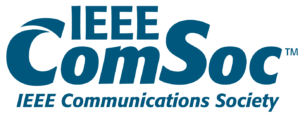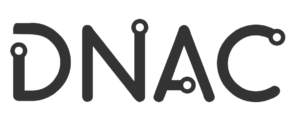Keynotes #1
Title: 6G and the next Horizon
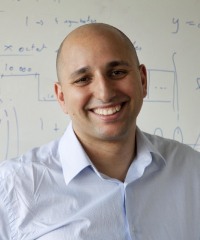
Merouane Debbah
(Director of the Mathematical and Algorithmic Sciences Lab (Huawei, France))
Bio: Mérouane Debbah received the M.Sc. and Ph.D. degrees from the Ecole Normale Supérieure Paris-Saclay, France. He was with Motorola Labs, Saclay, France, from 1999 to 2002, and also with the Vienna Research Center for Telecommunications, Vienna, Austria, until 2003. From 2003 to 2007, he was an Assistant Professor with the Mobile Communications Department, Institut Eurecom, Sophia Antipolis, France. In 2007, he was appointed Full Professor at CentraleSupelec, Gif-sur-Yvette, France. From 2007 to 2014, he was the Director of the Alcatel-Lucent Chair on Flexible Radio. Since 2014, he has been Vice-President of the Huawei France Research Center. He is jointly the director of the Mathematical and Algorithmic Sciences Lab as well as the director of the Lagrange Mathematical and Computing Research Center. He has managed 8 EU projects and more than 24 national and international projects. His research interests lie in fundamental mathematics, algorithms, statistics, information, and communication sciences research. He is an IEEE Fellow, a WWRF Fellow, a Eurasip Fellow, an Institut Louis Bachelier Fellow and a Membre émérite SEE. He was a recipient of the ERC Grant MORE (Advanced Mathematical Tools for Complex Network Engineering) from 2012 to 2017. He was a recipient of the Mario Boella Award in 2005, the IEEE Glavieux Prize Award in 2011, the Qualcomm Innovation Prize Award in 2012, the 2019 IEEE Radio Communications Committee Technical Recognition Award and the 2020 SEE Blondel Medal. He received more than 20 best paper awards, among which the 2007 IEEE GLOBECOM Best Paper Award, the Wi-Opt 2009 Best Paper Award, the 2010 Newcom++ Best Paper Award, the WUN CogCom Best Paper 2012 and 2013 Award, the 2014 WCNC Best Paper Award, the 2015 ICC Best Paper Award, the 2015 IEEE Communications Society Leonard G. Abraham Prize, the 2015 IEEE Communications Society Fred W. Ellersick Prize, the 2016 IEEE Communications Society Best Tutorial Paper Award, the 2016 European Wireless Best Paper Award, the 2017 Eurasip Best Paper Award, the 2018 IEEE Marconi Prize Paper Award, the 2019 IEEE Communications Society Young Author Best Paper Award and the Valuetools 2007, Valuetools 2008, CrownCom 2009, Valuetools 2012, SAM 2014, and 2017 IEEE Sweden VT-COM-IT Joint Chapter best student paper awards. He is an Associate Editor-in-Chief of the journal Random Matrix: Theory and Applications. He was an Associate Area Editor and Senior Area Editor of the IEEE TRANSACTIONS ON SIGNAL PROCESSING from 2011 to 2013 and from 2013 to 2014, respectively. From 2021 to 2022, he serves as an IEEE Signal Processing Society Distinguished Industry Speaker
Keynotes #2
Title: Blockchain for Cyberphysical Systems
Abstract: Cyber-physical systems (CPS) encompass a broad range of devices capable of sensing the environment and communicating with other users or devices. Heterogeneity of the devices, low resource availability, no or limited built-in security safeguards, centralized communication infrastructure, and large volumes of personalized data collected by the devices emphasise the trust, security and privacy challenges in CPS. In recent years, blockchain has attracted tremendous attention to address the outlined challenges due to its salient features including decentralization, anonymity, security, trust, and auditability.
This talk will discuss our work on blockchain for CPS. I will first discuss the challenges in existing CPS architectures, ranging from scalability, trust, privacy, and data integrity. This talk will explore the role of blockchain in addressing these challenges, along with blockchain design considerations that are pertinent for its application in CPS. Finally, I will cover multiple blockchain applications in CPS that we have targeted, including, supply chains, smart grids, intelligent transportation, and Internet of Things (IoT) data marketplace.
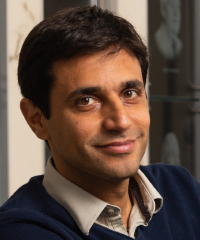
Raja Jurdak
(Director of the Trusted Networks Lab, QUT, Australia)
Bio: Raja Jurdak is a Professor of Distributed Systems and Chair in Applied Data Sciences at Queensland University of Technology, and Director of the Trusted Networks Lab. He received the PhD in information and computer science from the University of California, Irvine. He previously established and led the Distributed Sensing Systems Group at CSIRO’s Data61, where he maintains a visiting scientist role. He also spent time as visiting academic at MIT and Oxford University in 2011 and 2017. His research interests include trust, mobility and energy-efficiency in networks. Prof. Jurdak has published over 190 peer-reviewed publications, including two authored books most recently on blockchain in cyberphysical systems in 2020. He serves on the editorial board of Ad Hoc Networks, and on the organising and technical program committees of top international conferences, including Percom, ICBC, IPSN, WoWMoM, and ICDCS. He was TPC co-chair of ICBC in 2021. He is a conjoint professor with the University of New South Wales, and a senior member of the IEEE.
Keynotes #3
Title: Energy Efficient Fog, Cloud and IoT Networks
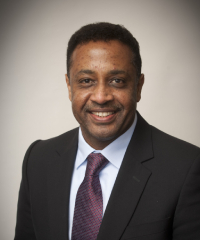
Jaafar Elmirghani
(Director of the Institute of Communication and Power Networks (University of Leeds, UK))
Bio: Prof. Jaafar Elmirghani is Fellow of IEEE, Fellow of IET and Fellow of Institute of Physics and Director of the Institute of Communication and Power Networks, Leeds. He has provided outstanding leadership in a number of large research projects, secured over £30m in grants and was PI of the £6m EPSRC Intelligent Energy Aware Networks (INTERNET) Programme Grant, 2010-2016. He was PI of the CHIST-ERA STAR project with a focus on energy efficiency, 2013-2016. He is Co-Chair of the IEEE Sustainable ICT initiative, a pan IEEE Societies initiative responsible for Green ICT activities across IEEE, 2012-present. He was awarded in international competition the IEEE Comsoc 2005 Hal Sobol award, 3 IEEE Comsoc outstanding technical achievement and service awards (2009, 2015, 2020), the 2015 GreenTouch 1000x award, IET Optoelectronics 2016 Premium Award for work on energy efficiency and shared the 2016 Edison Award in the collective disruption category with a team of 6 from GreenTouch for joint work on the GreenMeter. His work led to 5 IEEE standards with a focus on cloud and fog computing and energy efficiency, where he currently heads the work group responsible for IEEE P1925.1, IEEE P1926.1, IEEE P1927.1, IEEE P1928.1 and IEEE P1929.1 standards; this resulting in significant impact through industrial and academic uptake. He is Area Editor of IEEE JSAC series on Machine Learning for Communications and is PI of the EPSRC £6.6m Terabit Bidirectional Multi-user Optical Wireless System (TOWS) for 6G LiFi, 2019-2024. He has published over 550 technical papers, and has research interests in energy efficiency, optimisation, machine learning, cloud and fog computing.




